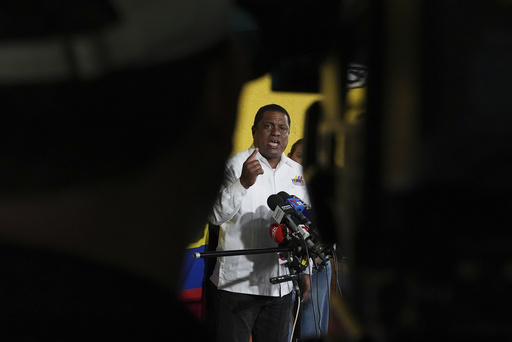
WASHINGTON — The administration of President Donald Trump has announced the termination of protective measures for around 350,000 Venezuelans currently residing in the United States. This decision leaves these individuals with just two months to prepare before they lose their ability to work legally in the country.
Homeland Security Secretary Kristi Noem’s directive impacts 348,202 Venezuelans who hold Temporary Protected Status (TPS), which is set to lapse in April. This group constitutes nearly half of the estimated 600,000 individuals benefiting from TPS, while the remaining protections will also terminate by the end of September. The notification regarding this termination is set to be published on Wednesday, following which it will take effect in 60 days.
This action is part of a broader trend from the Trump administration aimed at reshaping immigration policies, as officials work to fulfill commitments to address unauthorized residency in the U.S. and initiate one of the largest deportation drives in the nation’s history. For many Venezuelans in the U.S., this announcement has incited feelings of uncertainty and distress.
“I feel like I’m in limbo — I will be undocumented beginning in April,” expressed Henry Carmona, a 48-year-old Venezuelan. He explained that he sought refuge in the U.S. due to threats on his life back home. “Returning to Venezuela would mean jail for me. I fear for my safety.”
Carmona shared that prior to leaving Venezuela, he was employed as a painter with a government agency but found himself at odds with President Nicolás Maduro’s regime, leading to violence against him from paramilitary groups affiliated with the administration. After arriving in the U.S. in 2022, he was reunited in Miami with his wife and 17-year-old daughter, and they collectively applied for TPS. Currently working in construction, Carmona indicated that he would seek alternative legal avenues to remain in the U.S.
The Temporary Protected Status program was established in 1990 to offer refuge to individuals from countries afflicted by natural disasters or ongoing conflict, allowing them temporary work authorization for periods extending to 18 months. Approximately 1 million immigrants across 17 nations are covered under TPS, with Venezuelans being among the largest groups of beneficiaries.
In its announcement, the Department of Homeland Security contended that conditions in Venezuela had sufficiently improved to justify the cancellation of TPS. Noem added that the designation had facilitated the arrival of individuals lacking alternative paths for immigration to the United States.
She noted that the influx had led to challenges within local communities, referencing the Venezuelan gang Tren de Aragua as a concern among those migrating to the U.S. This gang, which emerged from a notorious prison in Aragua more than a decade ago, has proliferated alongside the exodus of millions fleeing Maduro’s governance to neighboring countries and the U.S.
Trump consistently highlighted the threat posed by gangs like Tren de Aragua during his campaign, prompting criticism that he was unfairly portraying all immigrants as criminals. Since 2013, over 7.7 million Venezuelans have fled their country amid widespread economic collapse and political turmoil, primarily settling in Latin America and the Caribbean. Nonetheless, a noticeable shift towards seeking refuge in the U.S. has emerged, particularly post-pandemic.
Venezuela’s prolonged crisis has decimated the middle class and driven numerous citizens into poverty, while its political landscape remains in disarray following Maduro’s inauguration for a third term last month, despite widespread reports that he lost to U.S.-backed opposition candidate Edmundo González in the July elections.
In response to the TPS withdrawal, opposition leader Maria Corina Machado revealed ongoing discussions with congress members in Florida and other states aimed at securing effective protections for law-abiding Venezuelans. She stated, “We aspire for Venezuelans to return only to a free and safe Venezuela, where persecution is nonexistent.”
Community advocates gathered in Doral, Florida—referred to as “Doralzuela” due to its significant Venezuelan population—expressing their opposition to the TPS termination. They argue that conditions in Venezuela have not improved enough to justify the return of displaced individuals.
Adalys Ferro, the executive director of the Venezuelan American Caucus, reaffirmed their commitment to utilizing all available legal channels to address the impending cessation of TPS. The TPS program allows participants to reside in the U.S. legally but does not offer a pathway to citizenship. This reliance on governmental renewals has caused concern among critics, who assert that continued renewals may become routine regardless of the situation in the country of origin.
In the concluding phase of the Biden administration, Alejandro Mayorkas, former Secretary of Homeland Security, extended TPS protections for Venezuelans until October 2026, a decision that Noem has since reversed. The current lack of diplomatic relations between the U.S. and Venezuela further complicates deportation efforts, although the Trump administration has prioritized reorganizing these processes. Following a recent diplomatic visit to Venezuela by special envoy Richard Grenell, which resulted in the release of six American prisoners, Trump indicated that Venezuela had expressed willingness to accept its citizens back, suggesting progress in addressing deportations.
As of now, the Venezuelan government has yet to confirm any such agreement. The Trump administration previously sought to terminate TPS for individuals from various countries, but advocacy groups have often successfully challenged these efforts through legal channels. The news regarding the termination of TPS was first reported earlier this week.

